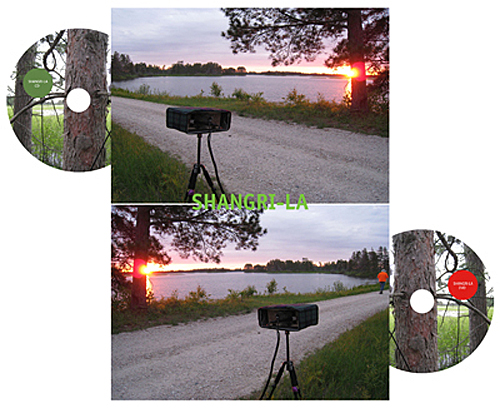Shangri La. DAVID MICHAEL
(3Leaves 2011)
‘Shangri-La is a fictional place described in the 1933 novel Lost Horizon by British author James Hilton. Hilton describes Shangri-La as a mystical, harmonious valley, gently guided from a lamasery, enclosed in the western end of the Kunlun Mountains. Shangri-La has become synonymous with any earthly paradise but particularly a mythical Himalayan utopia — a permanently happy land, isolated from the outside world. In the novel Lost Horizon, the people who live at Shangri-La are almost immortal, living years beyond the normal lifespan and only very slowly aging in appearance.’
-from Wikipedia
David Michael’s own Shangri-La is located in the Seney National Wildlife Refuge in Michigan’s Upper Peninsula, where he captured the sounds used on this work; ‘Shangri La’ comes in two versions both available under one release: a CD edit of almost an hour and twenty minutes long and a DVD edit of over ten hours and thirty minutes. The sounds depicted here are of wild life mostly birds and water; the listener can also hear insects and batrachians among other sounds.
Psychologist Eleanor Ratcliffe from the UK recently did a research on the effect of songbirds in the human brain, and the study concluded that:
“A great deal of anecdotal evidence suggests that we respond positively to birdsong.”
‘Shangri La’ is a great example of the joy, depth and meaning we get from listening to bird songs even on an acousmatic medium as the CD and the DVD: the removal from its context through a series of technological devices -microphones, pre-amps, recorders, computer, amps, speakers, headphones- doesn’t remove the apparent benefits of listening to the sounds of birds. Anyway ‘Shangri-La’ goes beyond any possible therapeutic aspect, but instead is charged with poetical and political content dealt with on a beautiful and effective formal way.
The artist becomes the finger pointing to the moon, where is the moon what matters and not the finger. He is showing a path that doesn’t necessarily lead somewhere but instead presents a escape of the man-made world that is harming our psyche, harming our world through the noise levels it creates.
Another sound that is very present in this work is the sound of running water: the white noise-like sonorities that water presents under certain circumstances are associated with meditation. White noise covers all the different frequencies of the spectrum and some say this helps the listener to “find” and depict sounds like it is mentioned on the book Siddhartha -by Herman Hesse- where the main character says that while listening to the sound of the river he could listen to a “many-voiced song’. An interesting fact about the white noise-like character of water is that each individual seems to hear different things, similar to what happens with the Rorschach test in psychiatry.
Probably what we are looking for on this mirroring / white noise-like water is indeed our own voice. On the movie ‘Solyaris’ by Andrei Tarkovsky there is a line of dialogue that can be of help here:
Dr. Snaut: ‘We don’t need other worlds. We need a mirror. We struggle to make contact, but we’ll never achieve it. We are in a ridiculous predicament of man pursuing a goal that he fears and that he really does not need. Man needs man!’
This also reminds me of the liner notes of the 3Leaves release “El Pájaro que escucha” where anthropologist Trixi Alina speaks about an inner-search David Vélez does in the outside while creating his own tune through the bird songs.
Anyway in a wider sense I feel that ’Shangri La’ is actually about time, about the dramatic condition of man trapped between the time of nature and the time of machines. A drama that goes beyond the sound aspect that puts man in a world he built but that he doesn’t want to longer inhabit, a man escaping from himself to find himself…complex, metaphorical, poetical and most important, pertinent and necessarily.
David Michael presents here his own version of paradise through the way Seney National Wildlife Refuge sounds like, making emphasis -mostly on the DVD edit- in the way time lapses there, slowly, organically, naturally, away from the fast, rushing and artificial time outside.
‘Shangri La’ is a work of strong political implications, just like most of the wild nature based phonographic releases out there, as it puts the sound pollution issue on the table and it does it in the most poetical and subtle way, by addressing the time-space phenomena in a contemporary romantic way.
This is a very successful work poetically, politically and formally that I would advice to listen in its long version, to get a “paradisiac” experience in the loud polluted world we inhabit in the large cities.
-John McEnroe


